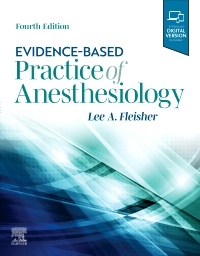
Evidence-Based Practice of Anesthesiology, 4th Edition
Paperback

Now $117.17
-
-
Explores important issues in perioperative management, discussing the available options, examining the relevant research, and presenting practical recommendations.
-
Features concise, to-the-point chapters with numerous quick-reference tables for fast and effective decision making.
-
Includes decision trees throughout to provide visual guidance and a logical flow of key decision points.
-
Contains nine new chapters on how to identify patients at risk for postoperative neurocognitive disorder; the best strategy for perioperative ACE and ARB agents; emergency laparotomy; optimal postoperative analgesia and the opiate naïve patient; the best method for perioperative handoffs; myocardial injury after non-cardiac surgery (MINS); and more.
-
Helps you master the current best practices you need to know for successful day-to-day practice and oral board review.
-
Enhanced eBook version included with purchase. Your enhanced eBook allows you to access all of the text, figures, and references from the book on a variety of devices.
-
-
1 Evidence-Based Practice Parameters: The Approach of
the American Society of Anesthesiologists
2 Is a Preoperative Screening Clinic Cost-Effective?
3 Which Patient Should Have a Preoperative Cardiac
Evaluation (Stress Test)?
4 Should Patients With Stable Coronary Artery Disease
Undergo Prophylactic Revascularization Before
Noncardiac Surgery?
5 Reducing Risk for Perioperative Stroke
6 How Should We Identify Patients at Risk for
Postoperative Neurocognitive Disorder?
7 Update on Preprocedure Testing
8 Is Routine Preoperative Pregnancy Testing
Necessary?
9 Should Preoperative Brain Natriuretic Peptide (BNP)
Be Measured Routinely?
10 How Should We Prepare the Patient With a
Pacemaker/Implantable Cardioverter-Defibrillator?, 75
11 What Are the Role and Management of Percutaneous
Coronary Intervention for Noncardiac Surgery?, 85
12 Should All Antihypertensive Agents Be Continued
Before Surgery?
13 Best Strategy for Perioperative Angiotensin-Converting
Enzyme-Inhibitor (ACE-I) and Angiotensin II Receptor
Blocker (ARB) Therapy Prior to Noncardiac Surgery
14 How Should Beta-Blockers Be Used Perioperatively?
15 Are Alpha-2 Agonists Effective in Reducing
Perioperative Renal Injury?
16 Does the Airway Examination Predict Difficult Airway
Management?
17 Do Checklists Improve Emergency Management?
18 Is There an Optimal Timing for Smoking Cessation?
19 Is There a Best Approach for Patients With Difficult
Airways: Regional Versus General Anesthesia?
20 Do Inhalational Agents Have Beneficial Effects on
Cardiac Ischemia-Reperfusion Injury?
21 Does Anesthetic Choice Affect Surgical and Recovery
Times?
22 Aspiration: Understanding the Risks and Optimizing
Management
23 Emergency Laparotomy
24 When Are Platelet and Plasma Transfusion
Indicated?
David Faraoni
25 What Is the Role of Ketamine in Perioperative
Management?
26 When Should Perioperative Glucocorticoid
Replacement Be Administered?
27 Does the Choice of Fluid Matter in Major Surgery?
28 What Are the Benefits of Different Ventilatory
Techniques?
29 What Is the Best Strategy for Prevention of
Postoperative Nausea and Vomiting?
30 Is There an Optimal Perioperative Hemoglobin?
31 Does Perioperative Hyperglycemia Increase Risk?
Should We Have Aggressive Glucose Control
Perioperatively?
32 What Is the Best Means of Preventing Perioperative
Renal Injury?
Marlies Ostermann, Enya Cooney, and Nuttha Lumlertgul
33 Is Nitrous Oxide Associated With Outcome?
34 Should Targeted Temperature Management Be Used
Routinely After Intraoperative Cardiac Arrest?
35 Fast-Track Cardiac Anesthesia: A Vital Core of
Perioperative Cardiac Surgery Programs
36 Can We Prevent Recall During Anesthesia?
37 Nonsteroidal Antiinflammatory Drugs, Antiplatelet
Medications, and Spinal Axis Anesthesia
38 Deep Vein Thrombosis Prophylaxis With Heparin
and Heparin-Like Drugs Used in Combination With
Neuraxial Anesthesia and Deep Plexus Blocks
39 Is There a Best Analgesic Technique for Hip
Surgery?
Stephanie Cheng, Bradley Lee, and Jiabin Liu
40 Should Regional Anesthesia Be Used for Orthopedic
Trauma Patients?
41 Is There a Best Technique to Decrease Blood Loss
and Transfusion After Coronary Artery Bypass
Grafting?
42 Is There a Best Technique in the Patient With
Increased Intracranial Pressure?
43 What Works for Brain Protection?
44 Optimal Intraoperative Technique to Prevent
Postoperative Delirium
Elizabeth Mahanna-Gabrielli and Stacie Deiner
45 What Actions Can Be Used to Prevent Peripheral Nerve
Injury?
46 Which Are the Best Techniques for Reducing
the Incidence of Postoperative Deep Vein
Thrombosis?
47 Does Neurologic Electrophysiologic Monitoring Affect
Outcome?
48 Anesthesia for Cesarean Delivery–Regional or
General?
49 When Should a Combined Spinal–Epidural Be Used?
50 What Is the Optimal Management of Postdural
Puncture Headache?
51 Does Anesthesia Increase the Risk to the Parturient
Undergoing Nonobstetric Surgery?
52 Does Labor Analgesia Affect Labor Outcome?
53 When Should Regional Anesthesia Be Used in
Pediatric Patients?
54 How Young Is the Youngest Infant for Outpatient
Surgery?
55 What Works in a Patient With Acute Respiratory
Distress Syndrome?
56 Optimal Discharge Strategy
Jake Fridman, Tanya Mehta, and John Nguyen
57 What Drugs Decrease Perioperative Bleeding?
58 What Must I Consider to Safely Anesthetize Someone
in the Office Setting?
59 Optimal Postoperative Analgesia for the Opiate-
Tolerant Patient
60 Optimal Postoperative Analgesia for the Opiate-Naïve
Patient
61 What Is the Best Method for Perioperative Handoffs?
62 Myocardial Injury After Noncardiac Surgery
Index

 as described in our
as described in our 